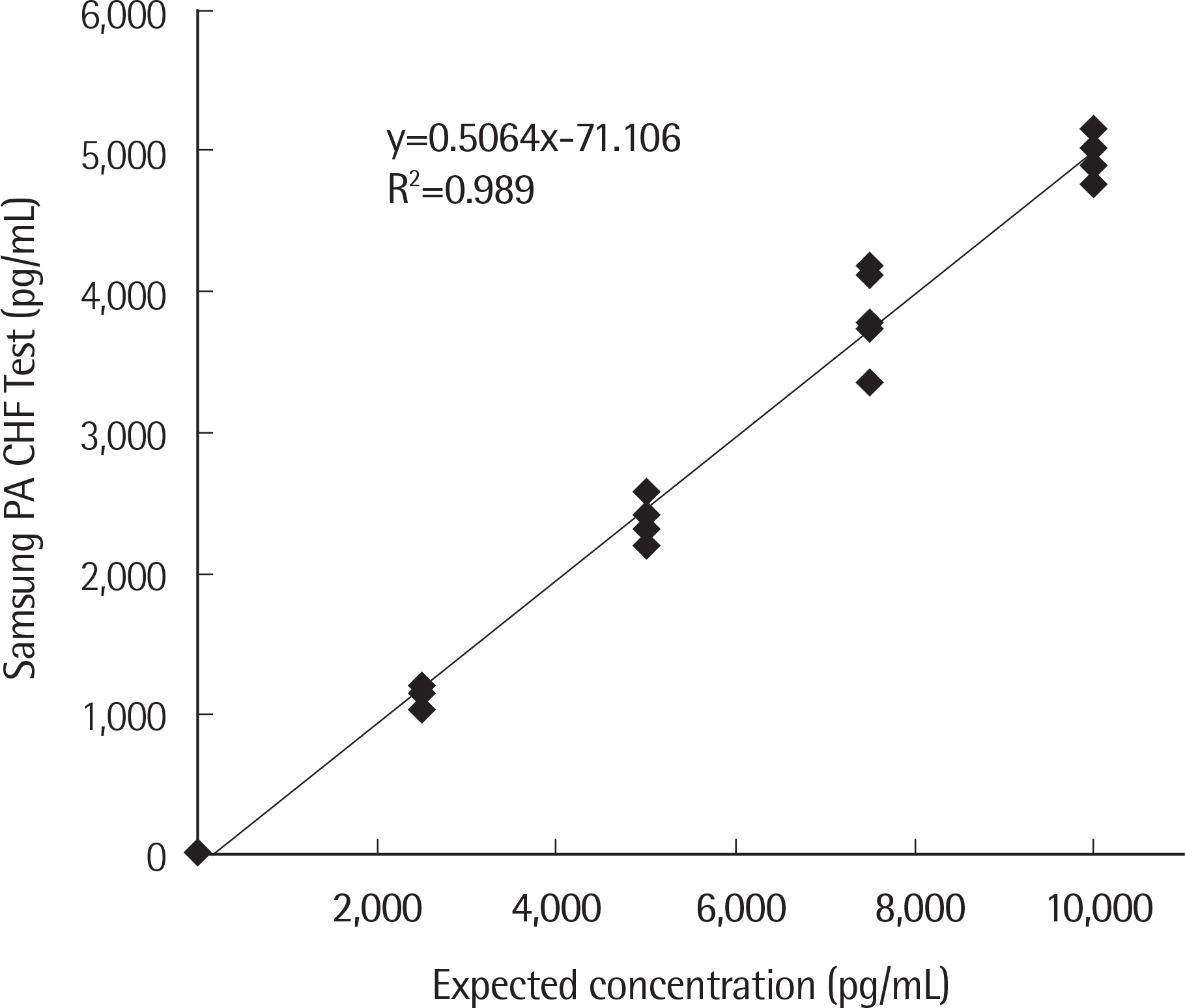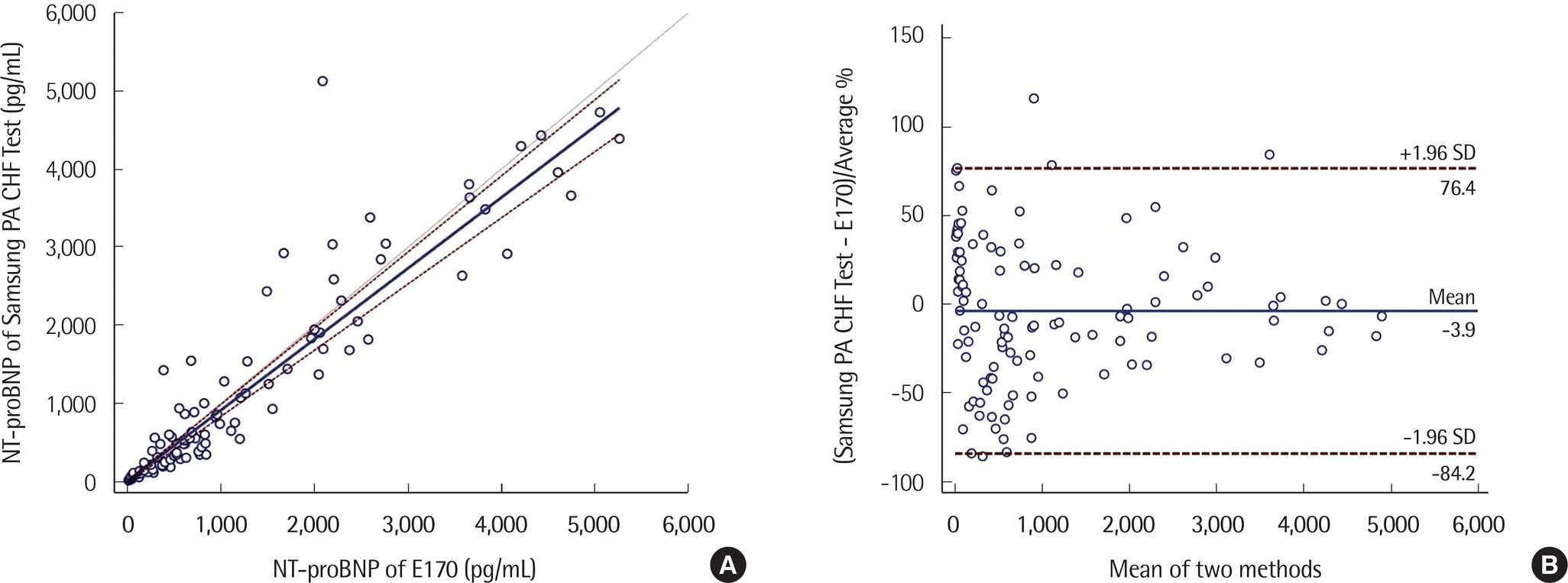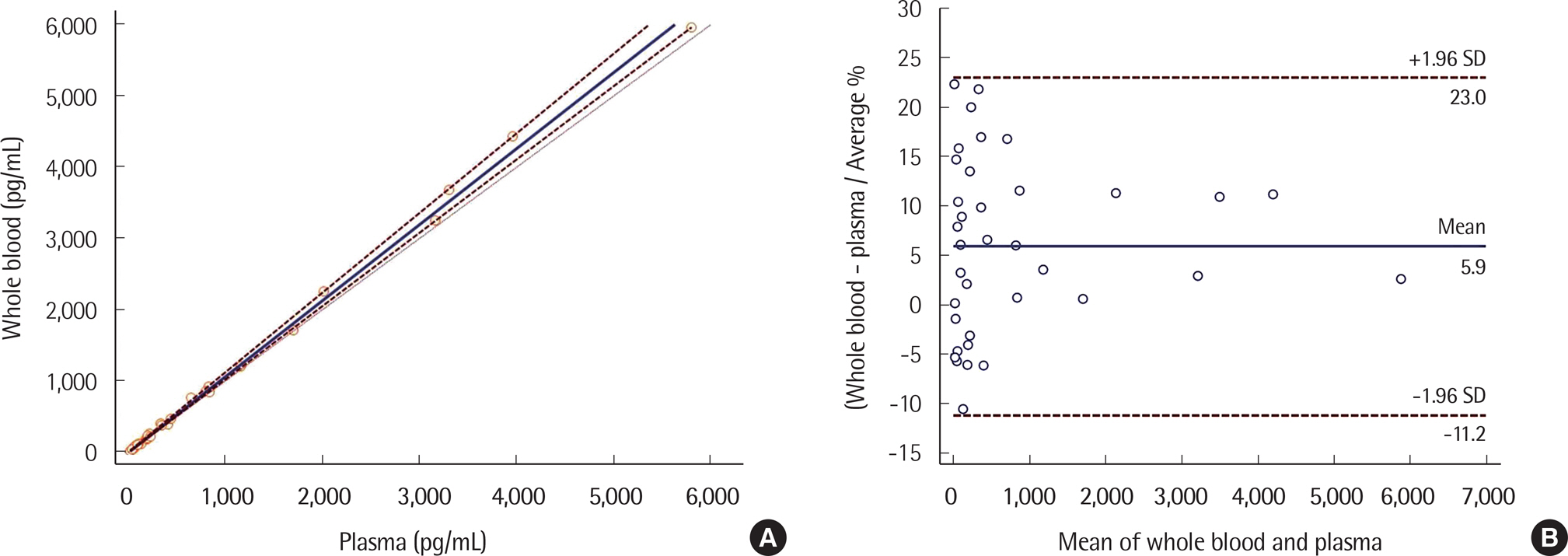Lab Med Online.
2017 Jul;7(3):135-140. 10.3343/lmo.2017.7.3.135.
Performance Evaluation of a Point-of-care Test, ‘Samsung LABGEO PA CHF Test’, for the Amino-terminal Pro-brain Natriuretic Peptide
- Affiliations
-
- 1Department of Laboratory Medicine, Seoul National University College of Medicine, Seoul, Korea. songjhcp@snu.ac.kr
- 2Department of Laboratory Medicine, Seoul National University Hospital, Seoul, Korea.
- 3Department of Laboratory Medicine, Seoul National University Bundang Hospital, Seongnam, Korea.
- 4Department of Biomedical Laboratory Science, Shinhan University, Uijeongbu, Korea.
- KMID: 2383092
- DOI: http://doi.org/10.3343/lmo.2017.7.3.135
Abstract
- BACKGROUND
The amino-terminal pro-brain natriuretic peptide (NT-proBNP) is a useful biomarker for the diagnosis of acute congestive heart failure. A point-of-care test (POCT) could rapidly detect the presence of NT-proBNP during emergencies. We evaluated the analytical performance of the new Samsung LABGEO PA CHF Test (Samsung Electronics, Korea).
METHODS
Based on the guidelines of the Clinical and Laboratory Standards Institute (CLSI), we compared the precision, linearity, and method with those of the E170 (Roche Diagnostics, Switzerland). Matrix comparison between the NT-proBNP values in whole blood and plasma was also performed, and the reference interval was determined using residual samples from healthy adults selected based on the evaluation criteria.
RESULTS
The Samsung LABGEO PA CHF Test provided results in approximately 18 min. The coefficient of variation (CV) of within-laboratory precision was below 6.8%. A desirable linearity was observed in the range of 0-10,000 pg/mL, with R²=0.99. The correlation with E170 was also excellent (N=108, r=0.96). NT-proBNP values in the whole blood were correlated with those in the plasma (N=36, r=0.99). The reference interval for the circulating NT-proBNP concentration was determined in 118 plasma samples from healthy subjects (26-75 yr of age). The 97.5th percentile was found to be 58.3 pg/mL.
CONCLUSIONS
The Samsung LABGEO PA CHF Test demonstrated a good analytical performance. It could be a powerful tool as a POCT for clinical practice, particularly during emergencies.
MeSH Terms
Figure
Reference
-
1. Lee JH, Lim NK, Cho MC, Park HY. Epidemiology of heart failure in Korea: present and future. Korean Circ J. 2016; 46:658–64.
Article2. Baek KK, Jeon ES, Rhee IL, Kim SH, Kim JS, Song PS, et al. N-terminal pro-B-type natriuretic peptide as a prognostic marker in acute coronary syndrome. Korean Circ J. 2004; 34:1070–81.
Article3. Cantor WJ, Fitchett D, Borgundvaag B, Ducas J, Heffernan M, Cohen EA, et al. Routine early angioplasty after fbrinolysis for acute myocardial infarction. N Engl J Med. 2009; 360:2705–18.4. Kim HN, Januzzi JL Jr. Natriuretic peptide testing in heart failure. Circulation. 2011; 123:2015–9.
Article5. Januzzi JL Jr, Camargo CA, Anwaruddin S, Baggish AL, Chen AA, Kra-user DG, et al. The N-terminal Pro-BNP investigation of dyspnea in the emergency department (PRIDE) study. Am J Cardiol. 2005; 95:948–54.
Article6. Bay M, Kirk V, Parner J, Hassager C, Nielsen H, Krogsgaard K, et al. NT-proBNP: a new diagnostic screening tool to differentiate between patients with normal and reduced left ventricular systolic function. Heart. 2003; 89:150–4.
Article7. Zaninotto M, Mion MM, Di Serio F, Caputo M, Ottomano C, Plebani M. PATHFAST NT-proBNP (N-terminal-pro B type natriuretic peptide): a multicenter evaluation of a new point-of-care assay. Clin Chem Lab Med. 2010; 48:1029–34.
Article8. Clinical and Laboratory Standards Institute. Evaluation of precision of quantitative measurement procedures; approved guideline. EP05-A3. Wayne, PA: Clinical and Laboratory Standards Institute. 2014.9. Clinical and Laboratory Standards Institute. Evaluation of the linearity of quantitative measurement procedures: a statistical approach; approved guideline. EP06-A. Wayne, PA: Clinical and Laboratory Standards Institute. 2003.10. Clinical and Laboratory Standards Institute. Measurement procedure comparison and bias estimation using patient samples; approved guideline - 2nd ed (interim revision). EP09-A3. Wayne, PA: Clinical and Laboratory Standards Institute. 2013.11. Ricos C, Alvarez V, Cava F, Garcia-Lario JV, Hernandez A, Jimenez CV, et al. Desirable specifcations for total error, imprecision, and bias, derived from intra- and inter-individual biologic variation. Westgard QC. Retrieved from. https://www.westgard.com/biodatabase1.htm. 2014.12. Khezri BS, Carlsson L, arsson A. Evaluation of the Alere NT-proBNP test for point of care testing. J Clin Lab Anal. 2016; 30:290–2.
Article13. Gils C, Ramanathan R, Breindahl T, Brokner M, Christiansen AL, Eng O, et al. NT-proBNP on Cobas h 232 in point-of-care testing: Performance in the primary health care versus in the hospital laboratory. Scand J Clin Lab Invest. 2015; 75:602–9.
Article14. Januzzi JL, van Kimmenade R, Lainchbury J, Bayes-Genis A, Ordonez-Llanos J, Santalo-Bel M, et al. NT-proBNP testing for diagnosis and short-term prognosis in acute destabilized heart failure: an international pooled analysis of 1256 patients: the International Collaborative of NT-proBNP Study. Eur Heart J. 2006; 27:330–7.15. Shi X, Xu G, Xia T, Song Y, Lin Q. N-terminal-pro-B-type natriuretic peptide (NT-proBNP): reference range for Chinese apparently healthy people and clinical performance in Chinese elderly patients with heart failure. Clin Chim Acta. 2005; 360:122–7.
Article16. Galasko GI, Lahiri A, Barnes SC, Collinson P, Senior R. What is the normal range for N-terminal pro-brain natriuretic peptide? How well does this normal range screen for cardiovascular disease? Eur Heart J. 2005; 26:2269–76.
Article17. Wolber T, Maeder M. Normal range of N-terminal pro-brain natriuretic peptide: a note of caution. Eur Heart J. 2006; 27:622; author reply. 622–3.
Article18. Wu AH, Smith A, Wieczorek S, Mather JF, Duncan B, White CM, et al. Biological variation for N-terminal pro- and B-type natriuretic peptides and implications for therapeutic monitoring of patients with congestive heart failure. Am J Cardiol. 2003; 92:628–31.
Article19. Zugck C, Nelles M, Katus HA, Collinson PO, Gaze DC, Dikkeschei B, et al. Multicentre evaluation of a new point-of-care test for the determination of NT-proBNP in whole blood. Clin Chem Lab Med. 2006; 44:1269–77.
Article
- Full Text Links
- Actions
-
Cited
- CITED
-
- Close
- Share
- Similar articles
-
- The Role of Brain Natriuretic Peptide in the Patients with Acute Dyspnea in the Emergency Department
- Biomarkers in Heart Failure: Focus on B-type Natriuretic Peptide
- Clinical Implication of B-type Natriuretic Peptide in the Elderly
- Serial Monitoring of B-Type Natriuretic Peptide in Heart Failure Patients
- Performance Evaluation of the LABGEO PT10 Point-of-care Chemistry Analyzer




